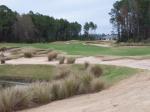
The word "classic" and Donald Ross' designs are synonymous. Pictures, like this from behind the 8th green at Oyster Harbors in Massachusetts, do not do the subtle contours justice.
Golf writer Bradley Klein has written an interesting piece for Golfweek about classic golf course design. In it, he reasons that, perhaps, we give too much credit to legendary designers (Ross, Tillinghast, MacDonald) and not enough to their successors working today. After all, Klein writes, the classic designers did not have to deal with environmental and other regulations that today's architects must finesse. Building today the potential classic course of the future is a more challenging proposition.
Any debate over which of today's architects will wear the mantle of a Ross or Tillinghast is subjective at best. We all certainly have our favorites, but a few standards for attaining Olympian status should apply, assuming golfers of the future still use a similar basic definition of "classic." Consistency of quality should be at the top of the list, although as Klein points out, even the master, Donald Ross, designed a few clunkers that eventually begged for redesign. But many basically untouched Ross classics survive that are memorable without seeming to try too hard to be so. I wish everyone, for example, could play Ross' Oyster Harbors on Cap Cod to undertand the notion of understated elegance in golf design.
Norman high on pot bunkers
Trying too hard disqualifies, say, a Greg Norman from my potential list of classic designers. In 2000, Norman designed the White Course at Doral with 237 bunkers, most of them pot-sized. In one spot, the Shark created a triple green (#s 11, 13 and 17) that made it difficult to get from the 13th green to the 14th tee. The 40 or so pot bunkers that separated the 13th from the 17th fairways provided another of many affectations on the course. The par 3 6th green, with its 10 yard wide green and narrow and sloping fringe areas, surround by a desert of crushed coquina shells, was notoriously hated by everyone who played it; at junior tournaments, groups would be stacked up at the tee waiting for those in front to chip back and forth across the putting surface before recording double-digit scores (and these were kids used to shooting in the 70s and 80s). In 2005, Doral had Norman totally redesign the course.
Shark created a triple green (#s 11, 13 and 17) that made it difficult to get from the 13th green to the 14th tee. The 40 or so pot bunkers that separated the 13th from the 17th fairways provided another of many affectations on the course. The par 3 6th green, with its 10 yard wide green and narrow and sloping fringe areas, surround by a desert of crushed coquina shells, was notoriously hated by everyone who played it; at junior tournaments, groups would be stacked up at the tee waiting for those in front to chip back and forth across the putting surface before recording double-digit scores (and these were kids used to shooting in the 70s and 80s). In 2005, Doral had Norman totally redesign the course.
Although his design at North Hampton in Florida tempts me to reconsider my criticism of Arnold Palmer's design skills, others of his layouts I have played shove huge bunkers in your face in the name of drama. Also, frankly, it is hard to discern how many Arnold Palmer Design courses actually bear the King's personal involvement. Word is that when Palmer shows up at a course he has "designed," he needs to be shown to the first tee to hit the inaugural drive.
Behold, the subtle beauty of the classic design
The classic course must be visually stimulating as well. One might argue that many of Ross's designs seem visually blah, with wide and often flat fairways sweeping their way toward greens that, on some of his courses, are small and crowned and on others (e.g. Pinehurst #2) are large and domed.
Experienced golfers, though, have a different view of things. My first round at the aforementioned Oyster Harbors, for example, was a
Ross' greens have their good sides and their bad.
revelation, the routing's muni-sized fairways appearing at first blush designed for fast play. But they turned out to be deceptively fair. I say "deceptively" because, although they were easy to hit, it took just a few holes to figure out that hitting the fairway was beside the point and that placement in them was everything. Ross' greens, as anyone who has watched the U.S. Open from Pinehurst or played #2 knows, have their good sides and their bad sides, literally. Great designs are irrelevant to their placement on a GPS; that is, whether on a flat piece of farmland or in the middle of a desert, classic designers build drama into their designs, whether or not they have the added benefit of surrounding mountains or adjacent waterscapes. Bill Coore and Ben Crenshaw, at Cuscowilla (Eatonton, GA), which I have played, did this quite well with an essentially flat piece of land. Tom Doak -- whose courses I have not played yet -- also gets special props for his "natural" routings.
Whose course is it, anyway?
Most of today's name designers do well on rendering dramatic landscapes, but the true classic test is whether the architect designs his golf course with the player or his own predispositions in mind. Former

successful PGA players seem to have the toughest time overcoming their own styles of play when they build a course (see aforementioned note on Greg Norman). On this score, and it pains me to say this about the designer of my vacation home course at Pawleys Plantation, the ubiquitous Jack Nicklaus designs may not be considered classics 50 years from now. Few of us normal golfers can cut three irons over bunkers to elevated greens, but that is what Jack forces upon the player at many of his courses. No improvement in equipment design will change that.
At Pawleys Plantation, for example, if the greens superintendent wanted to, he could put pins on 15 of the 18 holes to force approach shots to narrow patches directly over greenside hazards (water, bunker or steep elevation) with no hope of stopping the ball on the green. (Side note: An architect has to design as well for the elements, and even a junior meteorologist knows that greens within spitting distance of an ocean will be firm way more often than they are soft. The greens at Pawleys are always firm, and the rare occasion of a bump and run opportunity is cause for celebration and a rare decent chance at a one-putt par.)
When it's over, how does it feel?
The last test of a classic layout is a function of how you play the course the first time or two. Some of us get up for the big game, as it were, and if you can post a score around your handicap level, or even a stroke or two better, and leave the 18th green with a feeling of pleasant exhaustion, chances are you just played a course that forced you to grind it out and play well. The "exhaustion" factor is important because most of us can shred our index ratings on a flat and boring muni.
More likely, though, if the course is a classic in waiting, you will strike the ball reasonably well, throw-up (pun intended) a few more shots than your handicap indicates, and leave the 18th hole with begrudging satisfaction, if not a smile. This has happened to me most often on courses by Pete Dye and Tom Fazio, and less frequently, but enough, on Arthur Hills and Rees Jones layouts. Add layouts by Coore/Crenshaw and Doak (by reputation) to my list of classic composers in waiting.
I expect you will have your own choices. I'd love to hear your comments and promise to post them here. Please use the comment function immediately below.

For the visual drama of his layouts, such as the 4th hole at Ford Plantation, near Savannah, Pete Dye could someday be considered a "classic" designer.



























